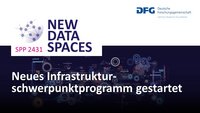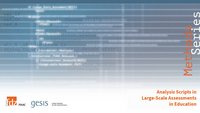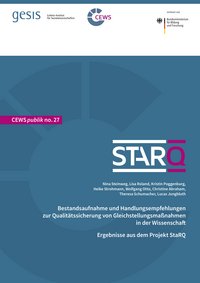Liebe Leser*innen, Mitte März konnte sich der GESIS-Standort in Mannheim über einen besonderen Besuch freuen: Die Präsidentin der Leibniz-Gemeinschaft, Prof. Dr. Martina Brockmeier, schaute im neuen Gebäude vorbei und traf sich mit einigen GESIS-Kolleg*innen zum Austausch über die Vernetzung innerhalb der Leibniz-Gemeinschaft und die Förderung von Wissenschaftler*innen in frühen Karrierephasen. Vielen Dank für den Besuch! Alle weiteren wichtigen News rund um GESIS lesen Sie wie gewohnt im folgenden Newsletter. Viel Freude bei der Lektüre wünscht Ihre Redaktion | Dear readers, In mid-March, the GESIS site in Mannheim was pleased to welcome a special visitor: The President of the Leibniz Association, Prof. Dr. Martina Brockmeier, stopped by the new building and met with some GESIS colleagues to discuss networking within the Leibniz Association and the support of scientists in early career phases. Many thanks for the visit! As usual, you can read all other important news about GESIS in the following newsletter. Enjoy reading! Your editorial team |
GESIS Fall Seminar in Computational Social Science 2023 – Save the Date The Fall Seminar takes place from 11 to 29 September 2023 at the GESIS premises in Mannheim. Its courses are taught by both GESIS and international experts and cover methods and techniques for collecting and analyzing digital behavioral data (“big data”), for example Machine Learning or Text Mining. Lectures in each course are complemented by hands-on exercises giving participants the opportunity to apply these methods to data. The Fall Seminar targets social scientists, data scientists, and researchers in the digital humanities who collect and analyze data from the web, social media, or digital text archives. Participants can pick from nine week-long courses, including introductory courses on Computational Social Science, Web Data Collection, Big Data Management, or Machine Learning, and more specialized topics such as Automated Image and Video Data Analysis, Deep Learning for Advanced Computational Text Analysis, or Network Analysis. All courses are held in English. Registration will open very soon and will be announced in the Training newsletter and the social media channels! For further information please visit our website.
Call for Papers: Special Issue of mda Exploring the Methodological Choices, Challenges and Solutions in working with New Data Sources Deadline for the submission of extended abstracts (500–1,000 words): May 19th 2023. Full papers are due by October 2, 2023. The special issue will appear in early fall, 2024. Further information
Meet-the-Expert geht weiter: Weitere Online-Veranstaltungen bis Juli Die folgenden Veranstaltungen in der Meet-the-Expert-Reihe „Umfragedaten durch Verknüpfung und Harmonisierung erweitern“ erwarten Sie bis zur Sommerpause: - 13.4.: Bbkggeocoder: a geocoding tool for survey data (Vortrag auf Englisch)
- 11.5.: Soziodemographische Variablen in Umfragen: Forschungspotenziale durch Output-Harmonisierung steigern (Vortrag auf Deutsch)
- 01.6.: "Ex Post-Harmonised" and Cumulated Comparative Survey Data Files at GESIS - and What to Expect Of Them (Vortrag auf Englisch)
Am 13.7. findet zudem erstmals eine Online-Podiumsdiskussion statt zu: „Gendergerechte Sprache in Umfragen – ja, nein, bis zu einem gewissen Grad?“. Schicken Sie uns im Vorfeld gerne ihre Fragen zu dem Thema an meetexperts(at)gesis(dot)org (bis 26.4.2023), die dann Teil der anschließenden Diskussion sein können. Anmeldung und weitere Informationen | GESIS Training
Workshops in June 2023 06/06-07/06/2023
Introduction to Geospatial Techniques for Social Scientists in R (Mannheim) 12/06/2023
Linking Twitter & Survey Data (Online) 19/06-20/06/2023
Automated Reports & Co with Quarto and Markdown (Online) 21/06-23/06/2023
Grundlagen und aktuelle Debatten der Regressionsanalyse (Mannheim) 26/06-28/06/2023
Geodata and Spatial Regression Analysis (Mannheim) 29/06- 30/06/2023
Introduction to Quantile Regression (Mannheim) Check out our other workshops! |
 | "New Data Spaces for the Social Sciences" - Call for Proposals im neuen DFG-Schwerpunktprogramm Am 15. März 2023 startete die Ausschreibung für Forschungsprojekte im neuen Infrastrukturschwerpunktprogramm „New Data Spaces for the Social Sciences”, das die Deutsche Forschungsgemeinschaft (DFG) jüngst eingerichtet hat. Das Schwerpunktprogramm soll neue Datenräume für die Sozialwissenschaften erschließen. Es ist längerfristig angelegt und zielt vor dem Hintergrund aktueller gesellschaftlicher Umbrüche auf die konsequente Modernisierung der sozialwissenschaftlichen Datenbestände und (Erhebungs-)Methoden ab. Mehr lesen...
"New Data Spaces for the Social Sciences" - Call for Proposals in the new DFG Priority Program On March 15, 2023, the call for proposals for research projects in the new infrastructure priority program "New Data Spaces for the Social Sciences", which was recently established by the German Research Foundation (DFG), will start. The priority program aims to open up new data spaces for the social sciences. It is designed for the longer term and, against the background of current social upheavals, aims at the consistent modernization of social science data stocks and (data collection) methods. Read more... |
 | Neue Publikation: Analysis Scripts in Large-Scale Assessments in Education: Scripts based on PIAAC data Research Data Center PIAAC at GESIS. (2023). Analysis Scripts in Large-Scale Assessments in Education: Scripts based on PIAAC data. (Methods Series). Köln: GESIS - Leibniz-Institut für Sozialwissenschaften. https://doi.org/10.21241/ssoar.85846 Die erste Ausgabe der Methods Series ist verfügbar und setzt den Fokus auf Analyse Skripte. Bestehende Analyse Skripte werden gesammelt und für die wissenschaftliche Community bereitgestellt. Mehr lesen...
New publication: Analysis Scripts in Large-Scale Assessments in Education: Scripts based on PIAAC data Research Data Center PIAAC at GESIS. (2023). Analysis Scripts in Large-Scale Assessments in Education: Scripts based on PIAAC data. (Methods Series). Köln: GESIS - Leibniz-Institut für Sozialwissenschaften. https://doi.org/10.21241/ssoar.85846 Compared with other social science data, the large-scale PIAAC data are very complex, which makes them difficult to analyze without prior knowledge. For example, they contain multiple competence estimates per person (10 plausible values) and a different number of weighting factors per country, which must be taken into account in the analyses. In this context, applying the appropriate analytical method and the available calculation procedures is a challenge, especially for early career researchers, as it is time-consuming and can be a significant source of error in published results. Read more... |
 | Neue Publikation: Neuert, Roßmann, Henning: Using Eye-Tracking Methodology to Study Grid Question Designs in Web Surveys Neuert, Cornelia E., Roßmann, Joss and Silber, Henning. (2023). Using Eye-Tracking Methodology to Study Grid Question Designs in Web Surveys. Journal of Official Statistics, 39 (1), 79-101. https://doi.org/10.2478/jos-2023-0004 Neuert, Roßmann und Silber untersuchen in einem Eye-Tracking-Experiment den kognitiven Informationsprozess und das Antwortverhalten bei der Beantwortung von Raster- und Item-by-Item-Frageformaten. Die Ergebnisse zeigen, dass beide Frageformate formatspezifische Einschränkungen zu haben scheinen, die sich direkt auf den Antwortaufwand auswirken. Mehr lesen...
New publication: Neuert, Roßmann, Henning: Using Eye-Tracking Methodology to Study Grid Question Designs in Web Surveys Neuert, Cornelia E., Roßmann, Joss and Silber, Henning. (2023). Using Eye-Tracking Methodology to Study Grid Question Designs in Web Surveys. Journal of Official Statistics, 39 (1), 79-101. https://doi.org/10.2478/jos-2023-0004 Neuert, Roßmann, and Silber examined the cognitive information process and response behavior when answering grid versus item-by-item question formats in an eye-tracking experiment. The results show that both question formats appear to have format-specific limitations, directly affecting the response burden. Mehr lesen... |
 | Neuer Beitrag im GESIS Blog: Dr. Dimitar Dimitrov schreibt über Twitter als Gatekeeper von Forschungsdaten und den Wert von TweetsKB Dr. Dimitar Dimitrov: Preserving Twitter Data for the Social Science Community.
DOI: 10.34879/gesisblog.2023.66 In diesem Blogbeitrag werden die jüngsten Entwicklungen beim Zugang zu Twitter-Daten erörtert, ihre potenziellen Auswirkungen beleuchtet, die Rolle von Infrastrukturen, die den Datenzugang ermöglichen, aufgezeigt und schließlich das einzigartige Forschungsdatenarchiv von GESIS vorgestellt. Mehr lesen...
New blog post: Dr. Dimitar Dimitrov writes about Twitter as a gatekeeper for research data and the value of TweetsKB Dr. Dimitar Dimitrov: Preserving Twitter Data for the Social Science Community.
DOI: 10.34879/gesisblog.2023.66 This blog post discusses recent developments in the access to Twitter data, their potential implications, the role of infrastructures institution for enabling data access and a unique research data archive offered by GESIS. Read more... |
 | Neue Publikation: Eder & Stadelmann-Steffen: Bringing the political system (back) into social tipping relevant to sustainability Christina Eder, Isabelle Stadelmann-Steffen: Bringing the political system (back) into social tipping relevant to sustainability,
https://doi.org/10.1016/j.enpol.2023.113529. Der Artikel verfolgt eine differenzierte Betrachtung der Rolle der politischen Sphäre bei sozialen Kippvorgängen. Dafür analysieren die Autorinnen die politische Sphäre entlang ihrer drei Elemente: Polity, Politics, Policy. Mehr lesen...
New publication: Eder & Stadelmann-Steffen: Bringing the political system (back) into social tipping relevant to sustainability Christina Eder, Isabelle Stadelmann-Steffen: Bringing the political system (back) into social tipping relevant to sustainability,
https://doi.org/10.1016/j.enpol.2023.113529. The article presents a differentiated view of the political sphere's role in social tipping. The authors analyse the political sphere along its three elements: polity, politics, policy. Read more... |
 | Zentrale Ergebnisse und Handlungsempfehlungen zu Qualitätssicherung in der Wissenschaft veröffentlicht Die Veröffentlichung „Bestandsaufnahme und Handlungsempfehlungen zur Qualitätssicherung von Gleichstellungsmaßnahmen in der Wissenschaft. Ergebnisse aus dem Projekt StaRQ“ präsentiert zum Projektabschluss im März 2023 einige zentrale Ergebnisse aus dem BMBF-geförderten Projekt StaRQ (2019-2023). Mehr lesen...
Key findings and recommendations for action on quality assurance in academia published The publication "Analysis and Guidelines for Quality Assurance of Gender Equality Measures in Academia: Results from the StaRQ project" presents some key findings (in German) from the BMBF-funded project StaRQ (2019-2023). Read more... |
Folgen Sie uns/ Follow us!
|

